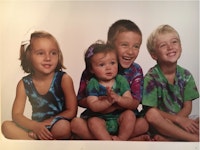The Greatest Gift for a Person
August 11, 2023


Twenty years ago, I attended my 10th business school reunion.
A classmate strolled up to me, explained that she had one toddle and one on the way and asked an odd question:
“If you could give a child one single gift, what would it be?”
Since I work with kiddos all the time, she assumed I would have an easy answer for this one, but I was flumoxed. I asked for her to give me until the end of the day to come up with an answer.
Susie and I talked about it. I consulted the Silver Fox (my wise mother).
We batted around several options. We quickly eliminated many that people seem to strive for, but do not correlate with contentment or fulfillment. These include beauty, height, athletic ability, wealth, and fame.
We had a list of things we loved, but they did not make the #1 item. They included a love of music, a desire to travel and an appreciation of nature.
We had one more list that made the finals. They included intelligence, wisdom, patience, kindness and friends.
But our final answer really excited us - and surprised my friend.
The greatest gift you can give a child is powerful narrative.
Please let me explain.
We can never control all the things that our children will encounter. We cannot protect them from all hardship or challenge. But we can help them develop a filter that enables them to not only survive, but thrive under adversity.
Here is an example of a powerful narrative - a helpful filter:
- I am worthy of love.
- Kindness matters.
- Hard work pays off.
- Everyone is trying their best.
- I am strong and can facilitate change.
- Within every challenge is an opportunity.
Compare that to a negative narrative:
- I am not enough (not smart enough, not attractive enough, not strong enough)
- You have to look out for #1.
- Nothing I does matters.
- Everything bad happens to me.
- There is no hope.
- I am stuck and cannot make my life better.
It is worth noting that the statements in the first narrative might not be 100% accurate 100% of the time, but they cultivate a mindset that fosters agency and hope. The second narrative can lead to hopelessness and depression.
When we shared this with my classmate, she was quite exited. A narrative (unlike raw IQ, beauty or musical talent) is something that a parent CAN help give to their child. Of course, we are not enough alone. As our children age, they start to get their lessons from people other than us, including friends, teachers, coaches, family members and mentors.
And, of course, camp people.
Susie and I can report that our quartet have very good narratives. While we like to think we were a big part of that, we also know that we are eternally grateful to the other adults who helped them grow. At the top of the list are the dozens of adults they learned from at the 7 camps they attended - including Champions of course.
Please know that we take the opportunity to foster great narratives very seriously. We train our counselors on techniques to build positivity and resilience. Ultimately, we believe that this is best reason to come to camp!
Steve Sir
